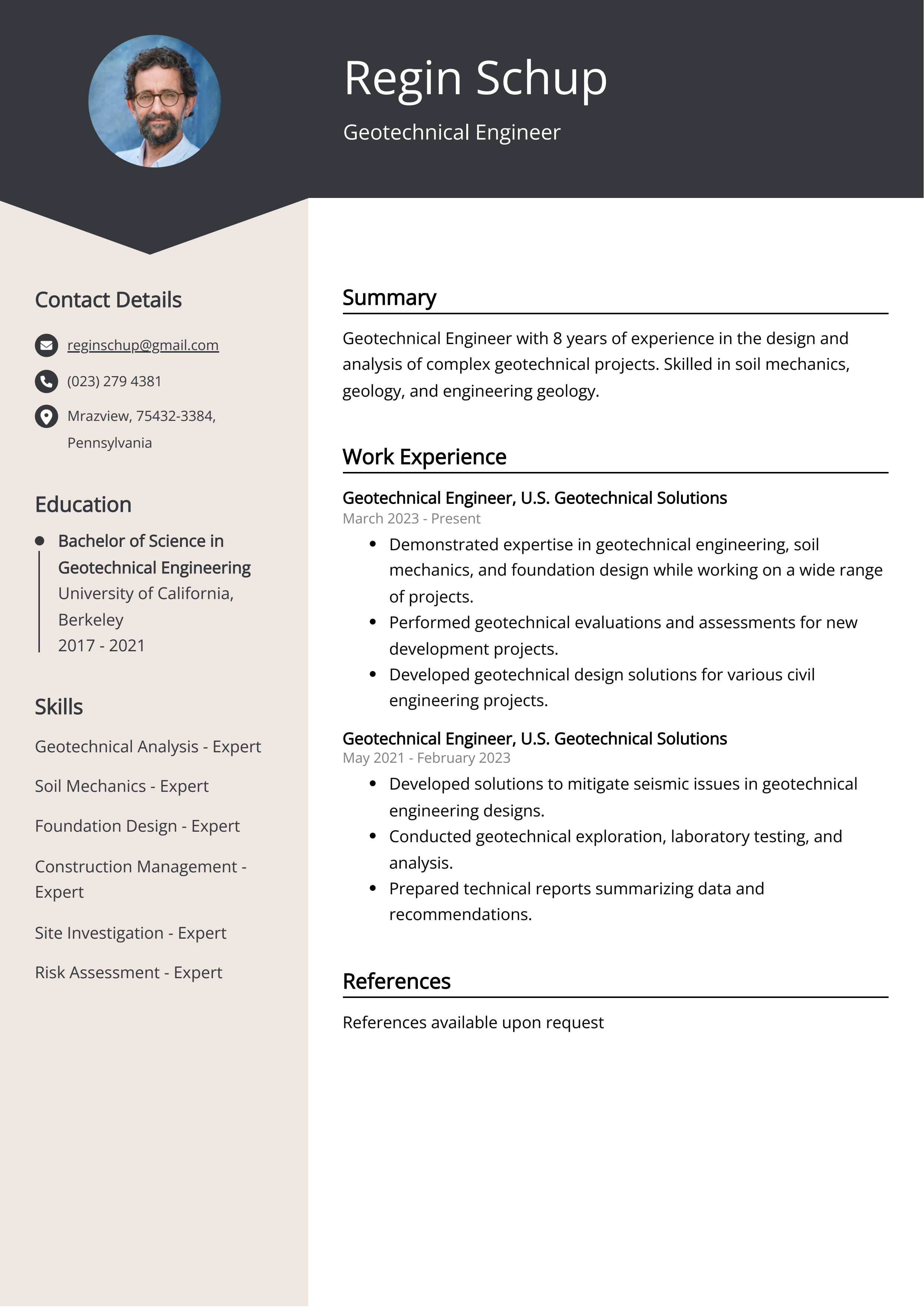Fascination About Geotheta
Fascination About Geotheta
Blog Article
5 Easy Facts About Geotheta Explained
Table of ContentsThe Best Strategy To Use For GeothetaUnknown Facts About GeothetaThe smart Trick of Geotheta That Nobody is DiscussingGetting The Geotheta To WorkFascination About Geotheta

They conduct website examinations, accumulate samples, perform research laboratory examinations, and assess information to review the suitability of the ground for construction projects - Consulting Engineer. Based on their findings, geotechnical designers provide suggestions for structure design, slope stability, maintaining frameworks, and reduction of geotechnical dangers. They work together with various other specialists, such as architects, architectural engineers, and construction teams, to guarantee that geotechnical considerations are incorporated into the general project style and application
By examining the behavior and properties of soil and rock, they can identify possible geotechnical dangers such as landslides, soil negotiation, or slope instability. Their competence assists prevent failures or accidents that could jeopardize lives and residential property. Below are some in-depth obligations and duties of a geotechnical engineer: Site Investigation: Geotechnical engineers conduct site investigations to collect information on subsurface conditions.
They interpret the data to comprehend the residential or commercial properties and actions of the dirt and rock, including their stamina, leaks in the structure, compaction features, and groundwater conditions. Geotechnical Evaluation and Design: Geotechnical designers analyze the information accumulated throughout website examinations to assess the security and suitability of the site for building projects. They perform geotechnical calculations and modeling to evaluate factors such as birthing capability, settlement, incline stability, side earth stress, and groundwater circulation.
About Geotheta
Foundation Design: Geotechnical designers play an essential duty in designing structures that can securely sustain the intended structure. They analyze the soil problems and lots demands to determine the proper structure kind, such as shallow foundations (e.g., footings), deep foundations (e.g (https://sketchfab.com/geotheta)., stacks), or specialized methods like dirt improvement. They consider factors such as negotiation limits, bearing capability, and soil-structure communication to develop ideal foundation styles
They examine construction plans, screen website activities, and conduct field inspections to confirm that the style suggestions are adhered to. If unforeseen geotechnical problems emerge, they evaluate the situation and offer suggestions for remediation or adjustments to the style. Risk Analysis and Reduction: Geotechnical designers evaluate geotechnical threats and dangers connected with the job website, such as landslides, liquefaction, or soil erosion.

Collaboration and Interaction: Geotechnical designers work carefully with various other specialists associated with a project, such as designers, architectural engineers, and building groups. Reliable communication and collaboration are necessary to integrate geotechnical considerations into the total job design and building and construction procedure. Geotechnical designers give technological know-how, response inquiries, and guarantee that geotechnical demands are satisfied.
Indicators on Geotheta You Should Know
Below are some types of geotechnical designers: Structure Engineer: Foundation engineers concentrate on developing and assessing structures for frameworks. They analyze the dirt conditions, load requirements, and site attributes to figure out the most appropriate structure kind and design, such as shallow structures, deep structures, or specialized techniques like pile structures.
They review the aspects affecting incline security, such as soil homes, groundwater problems, and incline geometry, and create methods to avoid incline failures and mitigate risks. Quake Engineer: Quake designers concentrate on evaluating and designing frameworks to withstand seismic pressures. They assess the seismic hazard of a site, examine soil liquefaction potential, and establish seismic style standards to make certain the safety and security and resilience of structures during quakes.
They carry out area screening, collect examples, and evaluate the collected data to characterize the dirt residential or commercial properties, geologic formations, and groundwater conditions at a site. Geotechnical Instrumentation Engineer: Geotechnical instrumentation engineers concentrate on surveillance and gauging the behavior of soil, rock, and structures. They set up and keep instrumentation systems that keep an eye on variables such as soil settlement, groundwater levels, incline movements, and structural displacements to examine efficiency and give very early warnings of potential concerns.
Some Ideas on Geotheta You Should Know
They carry out tests such as triaxial examinations, debt consolidation examinations, straight shear examinations, and leaks in the structure tests to collect information for geotechnical analysis and layout. Geosynthetics Engineer: Geosynthetics engineers focus on the layout and application of geosynthetic materials, such as geotextiles, geogrids, and geomembranes. They utilize these products to improve dirt security, strengthen slopes, supply drainage options, and control disintegration.
They tend to be investigative people, which suggests they're intellectual, reflective, and analytical. They are curious, systematic, reasonable, analytical, and rational. Several of them are additionally social, meaning they're kind, charitable, cooperative, patient, caring, helpful, empathetic, sensible, and pleasant. Does this sound like you? Take our cost-free job examination to learn if geotechnical designer is visit their website just one of your leading job suits.
In the workplace atmosphere, geotechnical engineers make use of specialized software application tools to perform calculations, develop layouts, and examine data. They prepare reports, testimonial project requirements, interact with clients and group members, and coordinate job tasks. The office setting supplies a conducive atmosphere for research study, analysis, and cooperation with various other specialists entailed in the task.
Geotheta Can Be Fun For Everyone
They frequently visit job websites to perform website examinations, examine geotechnical conditions, and collect information for analysis. These brows through include taking a trip to different places, often in remote or challenging surfaces. Geotechnical designers may carry out soil tasting, conduct tests, and screen building activities to make certain that the geotechnical aspects of the project are being carried out correctly.
Geotechnical designers also function in specialized geotechnical laboratories. Geotechnical research laboratory designers function extensively in these settings, managing screening devices, running instruments, and recording data.
Report this page